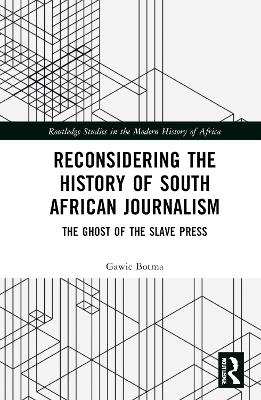
Reconsidering the History of South African Journalism
The Ghost of the Slave Press
Seiten
2025
Routledge (Verlag)
978-1-032-95471-4 (ISBN)
Routledge (Verlag)
978-1-032-95471-4 (ISBN)
- Noch nicht erschienen (ca. März 2025)
- Versandkostenfrei
- Auch auf Rechnung
- Artikel merken
This book presents an inclusive history of the founding of colonial newspapers and magazines, investigating the role that newspapers and journalism played at key points in the history of slavery and its aftermath. It will be of interest to scholars and students of journalism and media history, in South Africa and beyond.
The concept of the ‘free press’ is often celebrated as the vehicle which finally brought freedom of speech and democracy to post-apartheid South Africa, but historically, the position of the press was more complicated.
This book dives into the history of slavery at the Cape between 1800 and 1838, reflecting on the fact that several founding journalists and printers were slave owners themselves and advertised slaves as regular “property” in their publications. The book presents an inclusive history of the founding of colonial newspapers and magazines, driven by the question how we in the 21st century should make sense of the role that newspapers and journalism played at key points in the history of slavery and its aftermath. The ‘slave press’ was a label originally attached to The Cape Town Gazette and African Advertiser when it was founded by a pair of well-connected private British slave traders. This book challenges us to confront the ghost of the slave press, and to consider the complicated history of press freedom in South Africa.
This important book will be of interest to scholars and students of journalism and media history, in South Africa and beyond.
The concept of the ‘free press’ is often celebrated as the vehicle which finally brought freedom of speech and democracy to post-apartheid South Africa, but historically, the position of the press was more complicated.
This book dives into the history of slavery at the Cape between 1800 and 1838, reflecting on the fact that several founding journalists and printers were slave owners themselves and advertised slaves as regular “property” in their publications. The book presents an inclusive history of the founding of colonial newspapers and magazines, driven by the question how we in the 21st century should make sense of the role that newspapers and journalism played at key points in the history of slavery and its aftermath. The ‘slave press’ was a label originally attached to The Cape Town Gazette and African Advertiser when it was founded by a pair of well-connected private British slave traders. This book challenges us to confront the ghost of the slave press, and to consider the complicated history of press freedom in South Africa.
This important book will be of interest to scholars and students of journalism and media history, in South Africa and beyond.
Gawie Botma is Associate Professor and Researcher in the Journalism Department, where he is the PhD and MA programme coordinator, at Stellenbosch University, South Africa
Introduction Part 1: History 1. Slavery and the press 2. The founding of the “slave press” (1800-1826) 3. The rise of the “liberal” champions (1824-1829) 4. Freedom and feuds (1830-1838) Part 2: Content 5. News and comment 6. Advertisements Part 3: Aftermath 7. Legacy reconsidered 8. Conclusion
| Erscheint lt. Verlag | 5.3.2025 |
|---|---|
| Reihe/Serie | Routledge Studies in the Modern History of Africa |
| Verlagsort | London |
| Sprache | englisch |
| Maße | 156 x 234 mm |
| Themenwelt | Sozialwissenschaften ► Kommunikation / Medien ► Journalistik |
| Sozialwissenschaften ► Soziologie ► Spezielle Soziologien | |
| ISBN-10 | 1-032-95471-X / 103295471X |
| ISBN-13 | 978-1-032-95471-4 / 9781032954714 |
| Zustand | Neuware |
| Haben Sie eine Frage zum Produkt? |
Mehr entdecken
aus dem Bereich
aus dem Bereich


